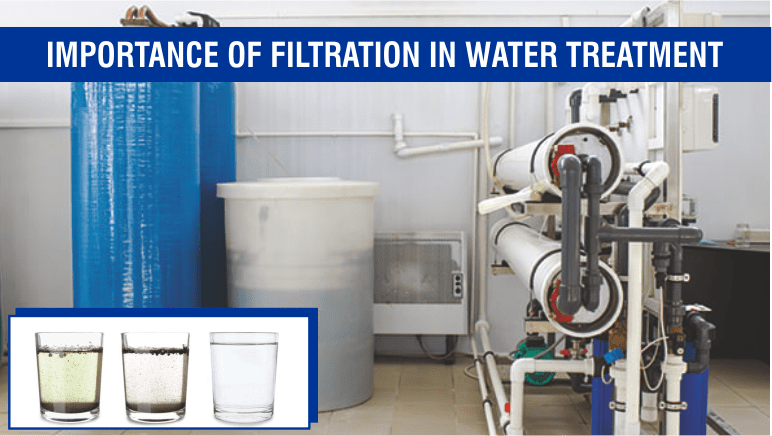


Mar 20
Manufacturers are thinking about cost-effective water filtration systems to reduce their water footprint, waste, and chemical usage due to, local water stress factors like pricing, wastewater treatment, availability and access to a clean water supply, and availability.
Because initial feed water qualities might vary from facility to facility, industrial wastewater reuse presents difficulties.
Why is Filtration Important for Waste Water Reuse in Water Treatment?
The removal of particles suspended in water is accomplished through filtration. Several methods for removing waste include surface capture, flocculation, sedimentation, and straining. Filters are categorised based on their primary method of capture, which is either deposition within the media or the exclusion of particles at the surface of the filter medium (straining) (in-depth filtering).
Filtration is essential for many commercial and industrial applications that reuse process water and effluent. In actuality, pumping wastewater from someplace like a refinery, food/beverage, textile, or oil produced water application requires pre-filtration due to high amount of suspended particles in these usual applications. To make sure that the treated water fulfils the necessary discharge or reuse standard, these applications often include numerous filtration and treatment procedures. Moreover, filtration in water treatment assures lower running costs for systems that polish water downstream.
For instance, water discharge from the oil and gas business may have oil concentrations of over 200 parts per million (ppm) and levels of total dissolved solids, whereas discharge water from the pulp and paper industry may have higher amounts of fibrous solids. The needed water purity may also change. Users could require a small upgrade to the water outflow to meet potable (drinkable) standards or to achieve ultra pure water quality.
Water filtration is also crucial for water treatment procedures like processing water or wastewater discharge or reuse.
Here are a few examples of advanced treatment procedures that must first successfully filter their inputs:
Particle Filtration
Solids and fluids are separated through the physical or mechanical process of particle filtration. One of the initial filtration phases in the treatment of industrial wastewater is known as particle filtration, which is commonly described as the filtration of particles larger than 1 millimeter. Bag filters, cartridge filters, multimedia filters, and self-cleaning filters are typical fine-particle filtration methods.
The qualities of industrial wastewater can vary greatly depending on the business, so it is typical to process the water using a variety of technologies. Which filter technologies are employed depends on the characteristics of the solids in the water, such as particle size, shape, density, stickiness, and amount, as well as those of other substances in the water, such as oil.
Membrane Filtration
Membrane filtration can be used to further clean the wastewater when fine-particle filtration alone cannot produce high-quality water for reuse. The eventual end use of the water—as a discharge, in wash stations, cooling towers, and processes; as makeup water for high-pressure boilers; or for semiconductors—determines the necessary treatment stages. The More consecutive technologies must be applied, the cleaner the water needs to be.
When it comes to reusing water and requiring the best water quality, integrated membrane systems and membrane technologies have taken the lead in the industry.
When it comes to reusing water and requiring the best water quality, integrated membrane systems and membrane technologies have taken the lead in the industry.
To remove pollutants such dissolved solids and tiny organic molecules to a tolerable level, reverse osmosis (RO) membranes are required.
Reverse osmosis frequently uses micro- or ultra-filtration (MF/UF) techniques as a pre-treatment. In addition, double membrane filtration offers a multi-barrier approach to removing germs or pathogens to assist make access to safe water easier.
Disinfection
Using oxidation, disinfection systems deal with microscopic microorganisms. The treatment effectiveness of these units is, however, reduced by interference brought on by particulate matter.
As an illustration, UV disinfection employs ultraviolet light to kill microorganisms. The light’s wavelength flows through the fluid from the light source to the intended pollutants. The light waves won’t be able to physically reach the contaminants that need to be properly cleaned if there are suspended particles in the influent.
Advanced Oxidation
Advanced oxidation methods are a group of chemical treatment techniques intended to oxidise away organic contaminants from water and wastewater. In a broad sense, advanced oxidation processes (AOPs) are a group of chemical treatment techniques created to oxidise organic (and occasionally inorganic) compounds in water and wastewater through interactions with hydroxyl radicals. Yet, with the right pre-filtration and further treatments, they can be completely kept out.
Coagulation
A certain amount of pre-filtration is necessary for efficient treatment, regardless of whether the coagulation system is chemical or electrochemical. To coagulate and flocculation tiny particles that don’t settle out quickly or effectively, coagulation systems are often used. The process is initiated by the addition of chemical additives or electrical currents. The target constituents’ concentrations must fall within a certain range for these methods to be most effective. Larger particles can be removed before these systems to guarantee that they operate as effectively as possible. Also, for the system to function properly with larger suspended particle concentrations, additional chemicals or voltage would need to be added. The relevance of filtration in water treatment is advised to lower operational expenses.
You can rely on H2OBAZAAR.COM for the highest-quality, turnkey industrial reverse osmosis systems as well as quick, easy access to professional assistance. We brings to you the best wastewater treatment plant in India. Are you interested in learning more about pre-filtration and why it’s so crucial to the processing of water and wastewater reuse? Make contact with H2OBAZAAR.COM’s water treatment specialists. When you have concerns about your industrial water treatment procedure or about which technology could be most advantageous for your operations, you can gain from discussing with our specialists.